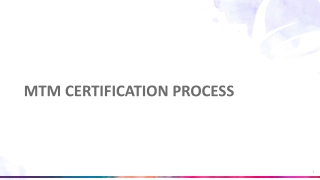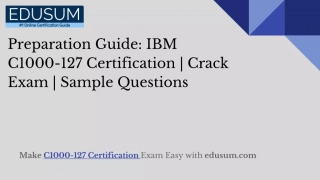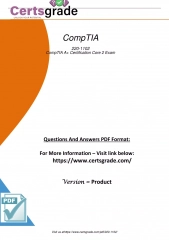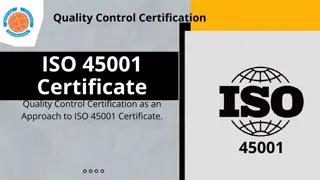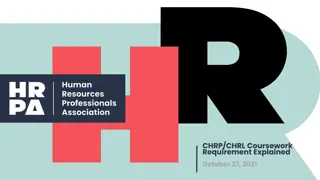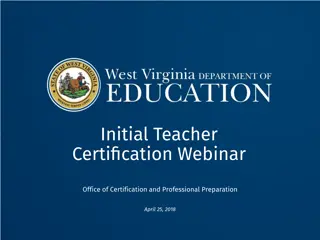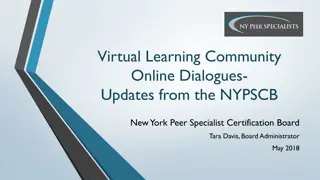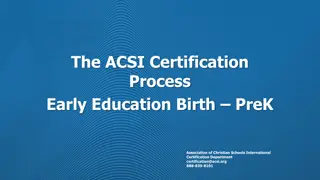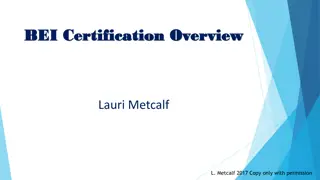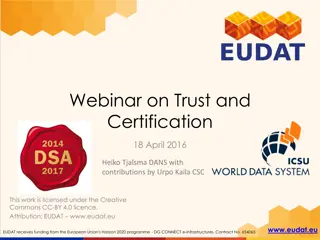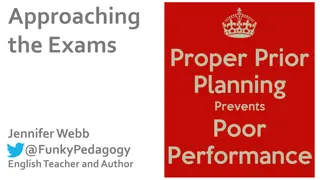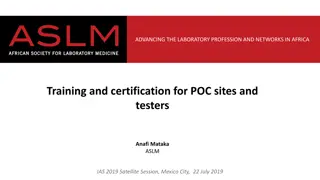Tips for Success in HRPA Certification Exams
Gain valuable insights and advice for excelling in HRPA certification exams from key personnel within the Human Resources Professionals Association. Learn about essential exam preparation strategies, the importance of sourcing accurate information, and valuable tips for managing exam anxiety. Discover the significance of understanding exam development processes and choosing the right preparation methods. This comprehensive guide covers everything from test-taking skills to remote proctoring options, ensuring you are well-equipped for exam success.
Download Presentation

Please find below an Image/Link to download the presentation.
The content on the website is provided AS IS for your information and personal use only. It may not be sold, licensed, or shared on other websites without obtaining consent from the author. Download presentation by click this link. If you encounter any issues during the download, it is possible that the publisher has removed the file from their server.
E N D
Presentation Transcript
Claude Balthazard, Ph.D., C.Psych., CHRL Registrar and Vice-president Regulation Human Resources Professionals Association cbalthazard@hrpa.ca 416-272-9750
Kelly Morris, CHRL Exams Manager Human Resources Professionals Association kmorris@hrpa.ca 416-923-2324 x342
Thomas Callitsis Exams Specialist Human Resources Professionals Association tcallitsis@hpra.ca 416-923-2324 x301
Housekeeping Webinar will be recorded and posted online This webinar is NOT eligible for CPD
Questions Involving Specific Individual Circumstances This webinar is not the appropriate place and time to address specific individual circumstances Sometimes the correct answer depends on details that are not provided with the question Please contact the Office of the Registrar registrar@hrpa.ca or exams@hrpa.ca with questions involving specific individual circumstances
Agenda The seven pieces of advice: 1. Go to the source 2. Understand how the exams were developed 3. Develop a plan 4. Choose exam prep methods that are right for you 5. Develop multiple-choice test-taking skills, but avoid tricks 6. Learn to manage exam anxiety 7. Remote proctoring or test centre?
Advice #1: Go to the source The first piece of advice is to get your information about the exams from the source this means HRPA s website or Office of the Registrar staff. We know that many exam candidates get their information from course instructors and others. Although these individuals are well-meaning, we have found that some of their advice is either outdated or incorrect. We know that many exam candidates get their information from social media groups i.e. Facebook groups. Although these individuals are well-meaning, we have found that some of their advice is incorrect. Exam candidates who have written exams are bound by a non-disclosure agreement and cannot reveal the content or provide hints about content of any exams to anyone on a study group. The reality is that anyone who has anything to do with the content of the exams is bound by a non-disclosure agreement.
Who really knows what is on the exam? HRPA s psychometrician John Wickett of Wickett Measurement Systems, Inc. Members of the CHRP and CHRL Exam Validation Committees Kelly Morris, HRPA s Exams Manager Thomas Callitsis, HRPA s Exams Specialist
Confidentiality agreement All exam candidates agree to maintain the confidentiality of the exams as one of the terms and conditions of writing the exam and sign a non-disclosure agreement There are multiple forms of the exam in each administration window The content of the exam is refreshed for each administration Hearing what previous exam candidates might remember of the exam is not likely to be useful to you and violates this agreement Consequences of violating this agreement could result in disciplinary action, a referral to HRPA s complaints committee or the nullification and/or voiding of exam results
Be wary of those who offer advice HRPA provides a lot of information on its exams There is no insider information No one or no organization has access to better or more accurate information than you do So, be careful out there
Advice #2: Understand how the exams were developed The CHRP-KE and CHRL-KE measure basic knowledge in HR the kind of knowledge candidates would be expected to have in order to be able to demonstrate the competency Basic knowledge not competence
HRPA publishes a lot of information about its exams HRPA Human Resources Professional Competency Framework Exam blueprints Question-writing style guidelines Technical manuals for previous administrations Webinars on exam development process Webinars on eligibility requirements for exams Webinars on remote proctoring
Where do the questions come from? The questions are written by subject matter experts that can include course instructors diploma course instructors and degree course instructors and HR Professionals who currently practice in the field The questions are referenced to the competencies in the HRPA Human Resources Professional Competency Framework. Question writers start from a given competency and then consider the knowledge would be required to be able to demonstrate the competency
Style guide All questions are in the same four-option multiple-choice format No all of the above No none of the above No a and b are true No double negatives No negative questions No trick questions
Multiple layers of review All CHRP-KE and CHRL-KE questions are reviewed for adherence to style guidelines All CHRP-KE and CHRL-KE questions are reviewed for having one and only one correct answer. All questions are fact checked independently, meaning that correctness of the correct option and the incorrectness of the incorrect options is verified against commonly used textbooks Questions are reviewed by a copy editor for consistency of grammar and style Questions are then reviewed and validated by HRPA s Exam Validation Committees
Exam blueprints and exam assembly The exam blueprints provide a listing of the major content areas and cognitive levels intended to be included on each exam form. It also includes the number of questions each exam form should include within each of these content and cognitive areas All our exam blueprints are published on the HRPA website The CHRP and CHRL Exam Validation Committees use the exam blueprints as their guide to assemble exam content Care is taken that there are no enemy questions
Post-exam review Despite all the layers of review, sometimes questions don t work like they are supposed to After each administration, questions are reviewed based on psychometric performance criteria by our psychometrician John Wickett Members of the Exam Validation Committee are convened to review the results with our psychometrician this process is called key validation
Floating pass scores There is no target pass rate The pass score is set for each form of the exam to reflect the same level of proficiency This is fine-tuning to ensure that the pass-score is set at the same level of proficiency every time (the number of questions to be answered correctly may vary somewhat, but the level of proficiency required to pass the exam does not change from one form to the next)
Compensatory and non-compensatory scoring Compensatory scoring means that a high score in one sub-domain will compensate for a low score in another. It s the total score that counts. The CHRP-KE has compensatory scoring Non-compensatory scoring means that in addition to a overall cut-score, there is a cut-score for each sub- domain. The CHRL-KE has non-compensatory scoring Non-compensatory scoring is like the coursework requirement a 70% average across all nine courses but with no single course under 65%
Compensatory and non-compensatory scoring If you are writing the CHRL-KE it is important to work on your weak subjects
Advice #3: Develop an exam preparation plan The plan should address content, process, and testing environment Conduct a self-assessment Assess your knowledge in the different functional areas
Conduct a self-assessment What has been your experience with important exams? What has worked for you and what hasn t? How would you assess your current level of knowledge in each functional area? Review the functional areas and competencies in the Competency Framework to identify the areas where you feel strongest and those which would benefit more from extra study Use the functional competencies matrices at the end of the Framework for added information about what is intended by each competency Some competencies are not covered on the CHRP-KE and that is noted in the matrices and on the CHRP-KE blueprint
Knowledge It is about facts Coverage is important Textbooks in reviewing textbooks remember it is about facts the depth of knowledge comes from the relevant HR textbooks- these same textbooks were used when you took the HR courses not required to purchase new textbooks use the textbooks you already have one textbook is not sufficient to cover the depth of knowledge required for the knowledge exams Consider glossaries Perhaps the most underutilized strategy Human Resources has a lot of specialized terminology If you can define all the specialized terms and describe of how each relates to other specialized terms you are likely in good shape
Acquiring and retaining the relevant knowledge Plan to review it all But if time is short focus on the functional areas where you are weakest and use the Competency Framework as a guide to further focus your studying
Is it possible to study too much? Yes, but it is highly variable from person to person and the intensity of the studying and how long ago you completed your coursework Three-months may be the optimum & develop a schedule over this time and pace yourself accordingly. Pacing is important here Carve out some extra time for studying just before test day
Advice #4: Choose exam prep method(s) that are right for you Let s review the pros and cons of the following exam prep methods: Self-study Study groups One-on-one mentoring College and university test centres prep programs Prep programs
What about writing exam questions and developing practice exams? Writing exam questions is a learning experience in its own right. One begins to think (and read textbooks) like a question writer Don t develop an expectation that the real questions will be like those you developed or that your performance on the real exam will be like your performance on practice exams
Advice #5: Develop or sharpen your multiple-choice test- taking skills Your test-taking strategy should consider three aspects: 1. Processing multiple-choice questions efficiently 2. Pacing and stamina 3. Managing exam anxiety
Processing multiple-choice questions efficiently All the usual advice Read questions completely before answering Eliminate options you know to be incorrect There is no penalty for incorrect answers, guess from among options you could not eliminate But there is also some advice out there that is not correct
Pacing Pacing making sure that one gets through the exam within the time allotted The CHRP-KE and CHRL-KE are designed to be all power and no speed meaning that candidates should have no problem in completing the exams. Indeed, 95% of the candidates writing the CHRP-KE and CHRL-KE have no problem completing the exams within the time limits The standard is one minute per multiple-choice question
Pacing The advice here is to learn to pace oneself. For instance, if you have answered 30 question in the first half hour or 60 questions in the first hour, you know you are on track Our computer-based exams, including the CHRP-KE And CHRL-KE, have a timer that counts down so you can pace yourself using this feature. Exam-writers also get 30, 15 min alerts But this is an average, not a limit. It is OK to spend more time on a question because you will be spending less than one minute on other questions
Advice #6: Learn to manage exam anxiety Exam anxiety is manageable Maintain a healthy lifestyle Get accurate information Study effectively Prepare to write the exam Adjust your attitude Change unhelpful thoughts Use test-taking strategies Use anxiety reduction techniques Source: https://www.lib.sfu.ca/about/branches-depts/slc/learning/exam-anxiety/reducing-exam-anxiety
Advice #7: Remote proctoring or test centre With remote proctoring come two new challenges managing the test environment and managing the technology Refer to the webinars on our website beforehand so there are no surprises on exam day
Whether remote proctoring or test centre Read through the confirmation of registration email sent by HRPA and the appointment confirmation email sent by Prometric to ensure you aware of all exam rules and regulations along with the security procedures Make sure you read all of it
Accommodations HRPA will provide accommodations in regard to exams and provide candidates with fair access to the exam By their very nature, accommodations are individualized All the information, the policy and forms required to request an accommodation are posted on the HRPA website Note that accommodations in a remote testing environment can present interesting challenges If you require an accommodation, please let HRPA exam staff know as early as possible



